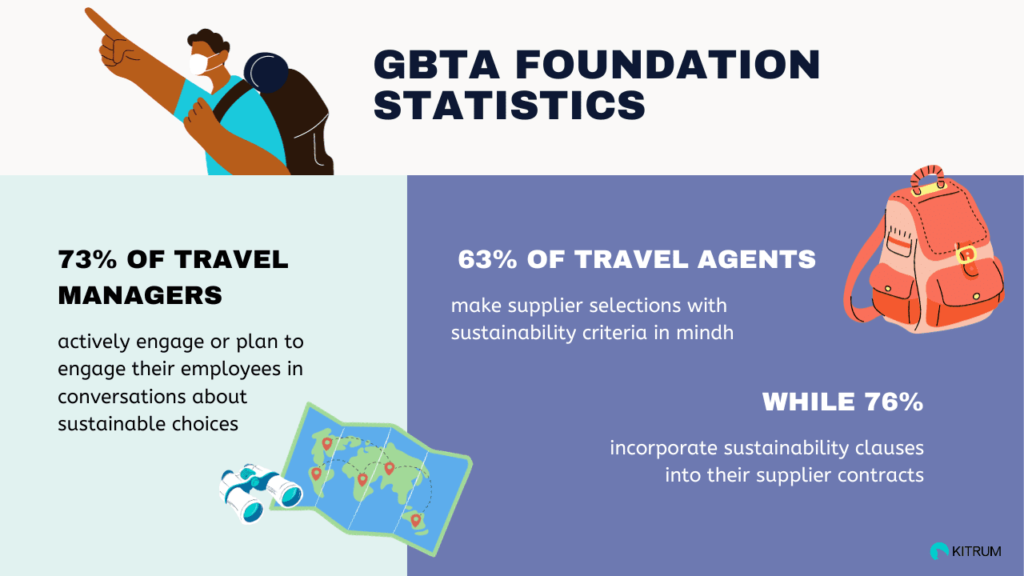Travel Tech Solutions: How Can a Travel Company Be Sustainable?
Did you know that the hospitality sector is responsible for approximately 1% of worldwide carbon emissions? While it may seem small, this actually represents a significant impact. On the other side, single-use plastics form about half of the yearly plastic manufacturing. Despite efforts in the industry to remove such plastics from their practices, they are still widely used in numerous hotels. Forecasts suggest that by 2050, the amount of plastic in the ocean will surpass the number of fish. So, nowadays, sustainability is no longer a mere buzzword. It’s a fundamental pillar that shapes the green future of the Earth and the success of businesses across industries.
Luckily, more and more travelers become eco-conscious. Recent data shows that 43% of travelers are choosing eco-friendly ways to travel, 49% like to support local businesses, 40% stay in places that are trying to be more eco-friendly, and 37% are willing to pay extra for green options like carbon offset programs.
This means that travelers are becoming more aware of their impact on the environment, which means businesses in the hospitality industry must focus on sustainability and adopt innovative technologies to keep attracting customers and stay competitive. So, how can travel be more environmentally sustainable?
What is sustainability in the tourism industry?
So, what does sustainability mean in the travel industry? The UN World Tourism Organization defines sustainable tourism as “tourism that takes full account of its current and future economic, social, and environmental impacts, addressing the needs of visitors, the industry, the environment, and host communities.”
At its core, the essence of sustainable tourism lies in the concept that when people travel, they should prioritize reducing emissions, improving energy efficiency, and minimizing waste. It is a responsible approach to tourism that balances environmental, socio-cultural, and economic factors. It aims to use environmental resources wisely, preserve cultural authenticity, and ensure fair economic benefits for all stakeholders, including host communities (local people) and the tourism industry (such as hotels, tour operators, transportation providers, and travel agencies.)
Achieving sustainability involves stakeholder participation, ongoing monitoring, and corrective actions as needed. It also aims to provide a fulfilling experience for tourists while promoting awareness of sustainability and responsible tourism practices.
Why is sustainability important for the travel industry?
Multiple people love traveling, but how many people consider its environmental impact? Take air travel, for instance, a significant contributor to greenhouse gas emissions. A single long-haul flight, such as the one from New York to London, can release approximately 1.6 tons of carbon dioxide (CO2) per passenger. Cruise ships, too, can emit large quantities of air pollutants and generate waste. Have you ever been to Venice? Then you have probably seen how overcrowding. Popular tourist destinations often face overtourism, which leads to overcrowding, environmental degradation, and strain on local resources. Through sustainable travel practices, we can effectively reduce tourism’s ecological footprint while simultaneously nurturing the well-being of our planet and the communities that welcome travelers.
So, here are some of the reasons why sustainable tourism is essential:
- Protecting nature;
- Fighting climate change;
- Preserving culture;
- Helping communities;
- Better travel experiences for everyone.
Sustainable tourism statistics
Now that we know how important travel sustainability is – let’s talk about sustainable tourism statistics. The numbers show that people in the tourism sector are aware of sustainability’s importance.

However, a lack of budget is the biggest barrier to decarbonizing programs and operations, as only 18% of travel buyers invest in buying Sustainable Aviation Fuel (SAF) certificates.
So, what should a travel business do to establish sustainability practices?
Tech solutions for the travel business
As travelers increasingly seek eco-friendly and responsible options, travel businesses embrace technology to meet these demands. From carbon offset platforms to sustainable booking engines, these innovative tech solutions allow travel companies to reduce their environmental footprint. Let’s take a look at some of the companies and tech solutions that travel companies can embrace:
Travel agencies
Cloud software for travel agencies
While travel agencies focus on communicating with clients and selecting optimal trips for them, they can also prioritize the maintenance of their IT infrastructure to ensure smooth operations. Green Cloud computing is an ideal solution for travel agencies that can highly improve their sustainability efforts.
It offers environmentally friendly features that significantly reduce their carbon footprint. By optimizing data center operations for energy efficiency and leveraging renewable energy sources, Green Cloud computing helps travel agencies minimize energy consumption and reduce reliance on fossil fuels. Dynamic resource allocation ensures that computing power and storage are used efficiently, preventing resource wastage and over-provisioning. Virtualization technology consolidates servers, further lowering energy consumption, while resource sharing and multitenancy minimize hardware duplication, resulting in a greener and more cost-effective approach to IT infrastructure.

Hotels and resorts
Energy management systems (EMS)
Energy Management System is a software application that monitors and controls electrical utilities and devices that consume electricity. For instance, it can control the HVAC systems in individual guest rooms within a hotel. EMS usually includes IoT components and technologies, such as IoT smart sensors (occupancy sensors, thermostats, keyless entry systems, motion detectors, and sensors designed for energy efficiency monitoring). These sensors are commonly used in various applications, including building automation and energy management systems.
For example, The Merrion Hotel in Ireland achieved a nearly 50% reduction in energy usage, courtesy of the Intelli-Hood system, which manages kitchen ventilation.
Another example is Oootopia, a Hong Kong-based luxury co-living space, which adopted EMS to improve its energy efficiency, productivity, and sustainability across its 3 properties. The hotel implemented occupancy sensors, smart A/C controllers, and energy meters to automate the Heating, Ventilation, and Air Conditioning (HVAC) systems based on room occupancy. This resulted in monthly savings of up to 30% in HVAC energy consumption, allowing Oootopia to offer more affordable room rates and encourage sustainable decisions among its guests.
Sustainable food practices
Hotels have many tech solutions to tackle food waste and promote sustainability in their dining operations. These solutions include optimizing inventory management, using tools for sustainable menu design featuring eco-friendly ingredients, measuring the correct quantity of needed food, and adopting food donation platforms.
Airlines
Сarbon offset solutions
Carbon offset programs allow travelers to offset the emissions from their trips by supporting climate change mitigation and carbon capture projects. Airlines can calculate emissions based on factors like distance and transportation mode, then clients are offered to invest in programs that fund projects reducing emissions or storing atmospheric carbon. Airlines adopting carbon offset programs are more likely to attract a growing number of customers, as an increasing % of travelers prioritize eco-friendly and sustainable travel options. It also demonstrates the airline’s commitment to reducing its environmental impact and positions the airline as a responsible and forward-thinking choice.
For example, multiple airlines offer passengers the opportunity to calculate the carbon footprint of their flights, explore greener options, and take part in offsetting programs.

For instance, Cathay Pacific Airlines provides a CO2 footprint calculator to determine the environmental impact of your journey. After that, the passengers can make a one-off contribution.
Summary
Adopting sustainability not only benefits the planet but also helps businesses to stay competitive, it allows travel businesses to tap into a growing market of environmentally conscious travelers and attract a lot of customers. Sustainability initiatives often result in cost savings. Energy-efficient technologies, reduced resource consumption, and streamlined operations lead to lower business operational expenses.
Businesses that prioritize sustainability often enjoy a positive reputation and improved brand image. Customers are more likely to choose companies that demonstrate a commitment to environmental responsibility. A strong sustainability stance can set a travel company apart from competitors and build trust among consumers, leading to customer loyalty and repeat business.
All in all, embracing sustainability in the travel industry is not just an ethical choice but a strategic one. By prioritizing eco-friendly practices, travel companies can tap into a growing market, reduce operational costs, enhance their brand image, and ensure compliance with evolving regulations. Ultimately, sustainability is the key to long-term business success in the travel industry.









